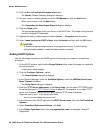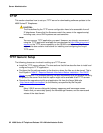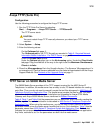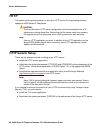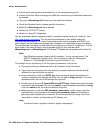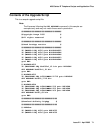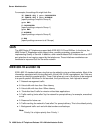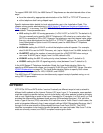
Server Administration
68 4600 Series IP Telephone Release 2.2 LAN Administrator Guide
● Download the self-extracting executable file, or the corresponding zip file.
● Extract all the files. When extracting the 4630 files, ensure that you allow the directories to
be created.
● Copy your 46xxsettings.txt file back into the download directory.
● Check the Readme files for release-specific information.
● Modify the 46xxsettings.txt file as desired.
● Restart the TFTP/HTTP Server.
● Reset your Avaya IP Telephones.
You can download a default upgrade script file, sometimes called merely the “script file,” from
http://www.avaya.com/support
. This file allows the telephone to use default settings for
customer-definable options. Of course, these settings can also be changed with DHCP or in
some cases, from the telephone’s dialpad itself. However, you might want to open the default
file and administer the options to add useful functionality to your Avaya IP Telephones. This file
must reside in the same directory as the upgrade script file, and must be called
46xxsettings.scr or 46xxsettings.txt. The Avaya IP Telephones can operate without this file.
Note:
Note: Most Windows systems interpret the file extension *.scr as a screen saver. The
4600 IP Telephones originally used *.scr to indicate a script file. Starting with
Release 1.7, the settings file can also have the extension *.txt.
The settings file can include any of the five types of statements, one per line:
● Comments, which are statements with a “#” character in the first column.
● Tags, which are comments that have exactly one space character after the initial #,
followed by a text string with no spaces.
● Goto commands, of the form GOTO tag. Goto commands cause the telephone to
continue interpreting the settings file at the next line after a # tag statement. If no such
statement exists, the rest of the settings file is ignored.
● Conditionals, of the form IF $name SEQ string GOTO tag. Conditionals cause the Goto
command to be processed if the value of name is a case-insensitive equivalent to string.
If no such name exists, the entire conditional is ignored.
● SET commands, of the form SET parameter_name value. Invalid values cause the
specified value to be ignored for the associated parameter_name so the default or
previously administered value is retained. All values must be text strings, even if the
value itself is numeric, a dotted decimal IP Address, etc.
Note:
Note: Enclose all data in quotation marks for proper interpretation.



